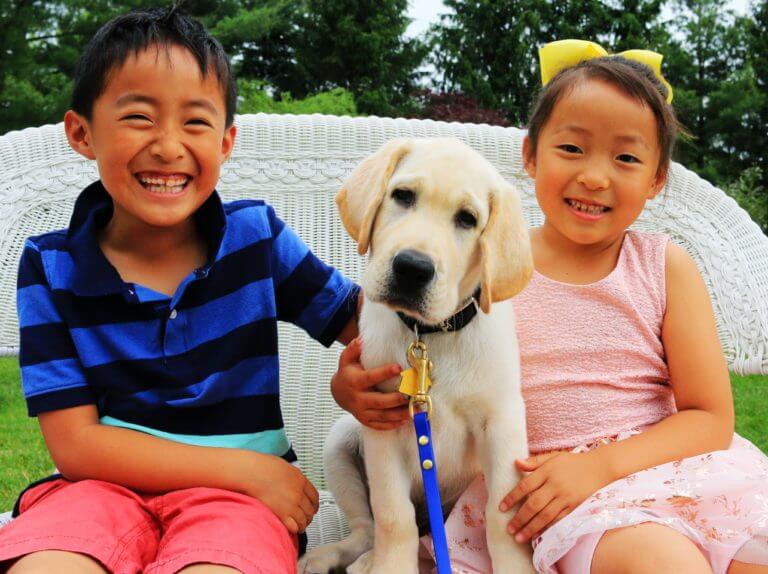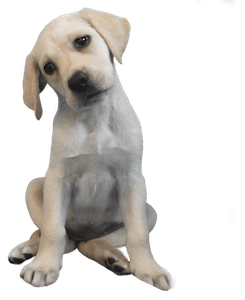Main Menu
| Puppy Raising | Become a Puppy Raiser
Learn first hand as puppy raisers share their experiences. Watch video here.
Puppy raising is a very rewarding experience that involves everyone in the household. Many of our raisers get involved because it is a project that individuals or families can do while meeting other people who also love dogs and want to help others. Learning life lessons, giving to others, and learning about dogs are among the reasons people are drawn to raising a potential guide dog puppy. Whether it is their first or twentieth puppy, raisers can take pride in knowing they have done something special. When the pup returns to Guiding Eyes, it may leave an empty space in your heart, but you have given a part of yourself to help another person.

We can teach you to train a puppy, but we can’t teach you to love dogs! Puppies grow, and it’s important that you feel comfortable around large adult dogs. Dog hair, cleaning up after the puppy, lots of sloppy kisses and other aspects of having a dog around come with the territory. Other dogs and cats in the family will need to be agreeable to having a new dog in the house.

Meet our adorable unmatched puppies! Available and waiting for a raiser home – click below for photos. They all have the same question:
Puppy raisers must be willing to devote adequate time to exercise, train, and attend regular puppy classes and evaluations. Puppies require daily instruction and monitoring from raisers as they monitor a pup’s activities and provide teaching lessons and praise for appropriate behavior during daily interactions. Proper house manners (e.g., staying off furniture and counters, ignoring items, etc.) are critical because the dog will eventually live with a visually impaired person. For the first four months, pups must be fed and let out of the crate to eliminate every 3-4 hours.
Is everyone in the family willing to raise a puppy and utilize the Guiding Eyes training methods and philosophy consistently when handling the puppy? Raisers embark on this journey open and willing to raise the pup using Guiding Eyes techniques. Our methods may be different from those they have used to raise their own dogs, but they must be applied consistently, requiring your persistence, patience, and perseverance.
There are other options for those that are unable to make the commitment to full time puppy raising. We have a cadre of puppy sitters that provide safe environments for our puppies when raisers are away on vacation or have other commitments. To apply to become a puppy program sitter, follow the same application process and choose “Puppy Sitter”.
One of the most critical contributions you will make is to help a puppy become confident, relaxed, and well-mannered in all settings. Confidence is a major factor in a dog’s success as a guide. Raisers provide socialization opportunities, exposing the pup to various noises, animals, stairs, grates, surfaces, people, and objects. Daily socialization experiences should be enjoyable, educational, and appropriate for the pup’s age and personality. Region Teams guide raisers in determining which experiences are appropriate and supportive of the pup’s confidence. to help the pup experience a variety of households, raisers are required to swap puppies with another raiser for a period of 1 to 2 weeks, at least once quarterly, unless otherwise instructed.
All family members will need to accept responsibility for keeping the pup safe, including keeping doors securely shut and harmful items out of reach. All rodenticides must be removed from property. Pups must be kept on leash or in a secure fenced area whenever outdoors and the raiser must stay outside with the dog to supervise their activities. If raising a female pup, raisers must take care during an their heat cycle to avoid contact with intact male dogs. Dog panties can be used to keep house clean. Raisers must be able to bend down to puppy height and physically handle an older 60 to 80lb dog on leash, for their safety as well as the dog’s.
Classes are usually held weekly at first, then progress to every other week as you and the puppy become more skilled. One on one “Walk and Talk” Evaluations are scheduled periodically with your Regional Puppy Instructor to monitor the pup’s progress and give you areas to focus on. When the pup comes to Guiding Eyes for its In-For-Training (IFT) test, we’ll ask you to complete a Raiser Final Evaluation report to help us learn more about the dog. Each time raisers send the puppy to a sitter, or puppy sits for another Guiding Eyes dog, the Puppy Sitter Form is filled out to ensure a smooth transition.
Raising a puppy is a collaborative effort. Much time and effort has been spent on the puppy’s development by staff and other volunteers. Successfully raising a puppy requires working together with your Regional Puppy Instructor, Region Team and other puppy raising volunteers. Being willing and able to work as part of a team and treating all members with mutual respect and kindness are key to the puppy raising experience. Also, being able to access online materials and to communicate by email as needed and in a timely fashion is essential.
Veterinary care for the pup will occur at a local veterinarian or at the Guiding Eyes veterinary facilities, as appropriate. Preauthorization is always required for non-routine care, except in the case of a life-threatening emergency.
Puppies are usually ready to come in for harness training between 14 and 18 months of age. Occasionally, raisers find that they are unable to continue their puppy raising commitment due to health, family situations, job changes, etc. In such situations, Guiding Eyes will arrange for the pup to go to another raiser to complete the raising process.
Guiding Eyes for the Blind is approved by the Internal Revenue Service as a 501 (C) (3) tax-exempt organization, and all donations are tax deductible to the extent provided by law.
Guiding Eyes for the Blind Federal Identification Number (EIN) is 13-1854606.
© 2023 GUIDING EYES FOR THE BLIND PRIVACY POLICY | ACCESSIBILITY STATEMENT
| Cookie | Duration | Description |
|---|---|---|
| cookielawinfo-checkbox-analytics | 11 months | This cookie is set by GDPR Cookie Consent plugin. The cookie is used to store the user consent for the cookies in the category "Analytics". |
| cookielawinfo-checkbox-functional | 11 months | The cookie is set by GDPR cookie consent to record the user consent for the cookies in the category "Functional". |
| cookielawinfo-checkbox-necessary | 11 months | This cookie is set by GDPR Cookie Consent plugin. The cookies is used to store the user consent for the cookies in the category "Necessary". |
| cookielawinfo-checkbox-others | 11 months | This cookie is set by GDPR Cookie Consent plugin. The cookie is used to store the user consent for the cookies in the category "Other. |
| cookielawinfo-checkbox-performance | 11 months | This cookie is set by GDPR Cookie Consent plugin. The cookie is used to store the user consent for the cookies in the category "Performance". |
| viewed_cookie_policy | 11 months | The cookie is set by the GDPR Cookie Consent plugin and is used to store whether or not user has consented to the use of cookies. It does not store any personal data. |